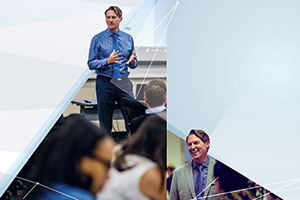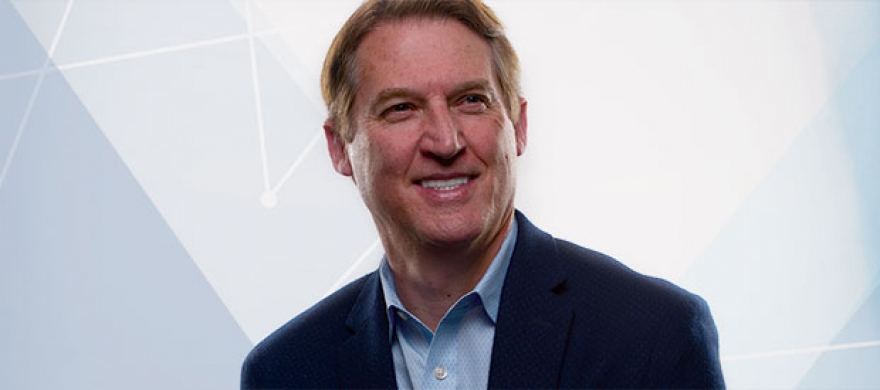Deryck J. van Rensburg
The Graziadio School’s new dean reflects on his corporate odyssey and the future of business education
Take one look at Deryck J. van Rensburg, installed last November as the ninth dean of the Graziadio School of Business and Management, and you immediately see the personal trappings of any corporate executive turned business school dean—a man tall in stature, affable in a nature, impeccably attired, and flashing a million-watt smile that would give even Julia Roberts pause. Confident, stylish, and charming, it’s easy to imagine a not-too-distant future where he becomes affectionately known as the debonair dean.
But as soon as Van Rensburg delivers his congenial greeting, you realize there is
more to this man’s story. Betrayed by an inviting, if not slightly enigmatic accent,
the 58-year-old South African native speaks with casual elocution, occasionally softening
his voice as he reflects on the milestones of his life and the journey he has traveled
to be where he is today.
Born in 1959, Van Rensburg was raised in South Africa when Apartheid was the law of
the land. His story truly begins, he says, at age 4 when his mother walked out on
his family, a moment he characterizes as the most formative event of his life and
one that—even at his young age—would shape his ability to trust and believe in people.
“It was a defining moment in my story,” shares Van Rensburg, “and one that would sound
pretty bleak if it weren’t for God.”
Growing up in a large blended family following his father’s remarriage, at age 18
Van Rensburg began two years of compulsory military service, assigned to the police
force in Johannesburg during the time of the Soweto uprising in 1976. With no particular
ambition to go to college up to that point, he says his perspective on a college education
changed as he faced the prospect of a life in the South African police force. Soon
after he enrolled at Rhodes University in Grahamstown, South Africa, where he encountered
his “Damascus Road” experience.
“As I was sitting in one of my first-year classes, I had no idea what I wanted to
do, and this marketing professor walked in and changed my life,” says Van Rensburg.
“He was so into his subject. There was chalk flying. He was really living it, and
it exuded out of him. And I said, ‘That’s what I want to do.’ He changed me.”
At the encouragement of his professor, Van Rensburg took the first step into his career
in business and marketing, qualifying for a position in a highly selective entry-level
program at Unilever, the premier consumer package goods company with offices based
in Durban, South Africa. His first foray was in the food business on the company’s
brand management track.
While at Unilever and living in Durban, Van Rensburg shares that God had started calling
him to make some tough decisions about the direction of his life. “We were in the
middle of Apartheid and were wrestling with questions like, ‘What’s our role and responsibility
as Christians in the context of a nation that is characterized by policies that were
so anti-biblical?’”
In 1988 Van Rensburg and his new bride, Rozanne, felt called to leave South Africa
and relocated to the United Kingdom. Van Rensburg first earned his MBA while in England,
followed by a training and development company in Brussels, Belgium, and assumed his
final post at Unilever in London, working for another six years in Elida Faberge.
And then Coca-Cola called. “At that time, Coca-Cola had a chief operating officer
who had a very ambitious growth vision for the company and felt the talent bench needed
to be strengthened with 50 additional managers,” explains Van Rensburg. “I was a marketing
person but wanted to be a general manager, so I went for the interview, got the job,
and started in the London office with Coca-Cola as the customer strategy director
for European retailers.”
But that assignment wouldn’t last long. Just eight months later, Van Rensburg began
something of an international tour with Coca-Cola, accepting a new role as region
manager in Vienna, Austria. Two years in, he was then approached about another transfer—this
time to Bucharest, Romania, to run five East European countries.
The decision would be among his hardest yet, especially as he considered the impact
relocating to Romania would have on his family. “I wanted to go west, not east,” says
Van Rensburg. “But sometimes the doors in life aren’t the doors you think you should
go through. They’re not attractive; they don’t look right. If God is in it, though,
he knows what’s next.”
Van Rensburg’s business prowess was tested as soon as he landed in Bucharest, just
days before the 1998 Russian financial crisis that rocked most of eastern Europe.
“There I was, this young general manager now, responsible for five countries in an
absolute crisis, and I had no clue what to do,” says Van Rensburg.
In an unusual move, he reached out to one of Romania’s independent franchise bottlers
for advice. “The onus is on the Coca-Cola Company to provide strategic leadership,
so it was unusual from someone on my side of the franchise to approach the bottler
for direction.”
Van Rensburg’s humble request, however, was the beginning of a constructive dialogue
between company and partner, and with some creative thinking around pricing strategy
and the consolidation of Coca-Cola’s franchise bottlers in the country, he was able
to right-size the organization and return its revenue stream to a sustainable level.
After one year in Romania, Van Rensburg accepted his next assignment in Athens, Greece,
running 20 countries for Coca-Cola as the company’s president of the Southeast Europe
and Gulf Division, before heading to Berlin nearly four years later to lead the Germany
and Nordics Division. As the biggest market in Europe, that division was also the
most structurally challenged. While huge and profitable, it hadn’t grown in nearly
a decade, pushing Van Rensburg to examine the culture and capabilities of his team,
as well as his own leadership style.
“It was phenomenal what we accomplished just by the team re- appreciating it had the
capabilities and ideas,” explains Van Rensburg, acknowledging the pitfalls of organizations
deadlocked by corporate culture and structure. “And I realized we were the people
we had been waiting for. There was not going to be someone to walk in and save the
day for us.”
Employing his team’s feedback, Van Rensburg spearheaded a new vision and strategy
to grow the division and in the process began the monumental challenge to consolidate
21 long-time bottling partners into one.
His division was shortlisted as one of the best performing divisions for Coca-Cola
two years in a row.
In 2007, following more than a decade with the company, Van Rensburg finally crossed
the pond to serve as Coca-Cola’s president of venturing and emerging brands, a new
corporate venturing group at the company’s headquarters in Atlanta, Georgia. Developed
in response to the stagnation of Coca-Cola’s core businesses, this group was charged
with discovering innovation in the entrepreneurial community that was introducing
new beverages and new product categories.
“We figured out a really good formula to retain the strengths of entrepreneurialism,
and the passion and inspiration of each founder, while leveraging the scale of a large
company,” he reveals. That post evolved into his work as president of Coca-Cola Global
Ventures, his last position with the company, which looked at new disruptive platform
technologies for the beverage giant.
Van Rensburg’s introduction to Pepperdine came—as introductions to universities so
often do—through one of his children. Despite all four of his children being born
and raised in Europe, certain hobbies seemed to be ingrained in their South African
DNA, including a love of surfing by oldest son Joel (’12), which ultimately led to
his discovery of Pepperdine. Following in his brother’s footsteps, second son Micah
(’14) enrolled two years later, and daughter Bethany has just completed her first
year.
One day while Van Rensburg was still working in Atlanta, he met with former Pepperdine
vice chancellor John Miller, who asked him whether he would ever consider heading
the Graziadio School. After 32 years in business and more than two decades with perhaps
the most recognizable brand in the world, Van Rensburg already knew the answer to
that question.
“It came at the right stage of my life as I was thinking about Deryck 2.0 and doing
something that would develop the next generation of leaders,” explains Van Rensburg. Now more than six months in as the school’s chief executive officer, Van Rensburg
is already leaving his mark on Graziadio as he considers the kinds of disruptions
needed in business and academia. “Business is one of the most powerful social institutions
of our age,” says Van Rensburg, who interviewed 26 deans and former deans of business
schools before beginning the role. “And we’ve seen what happens when you decouple
an ethical framework from a leader in business.”
Now more than six months in as the school’s chief executive officer, Van Rensburg
is already leaving his mark on Graziadio as he considers the kinds of disruptions
needed in business and academia. “Business is one of the most powerful social institutions
of our age,” says Van Rensburg, who interviewed 26 deans and former deans of business
schools before beginning the role. “And we’ve seen what happens when you decouple
an ethical framework from a leader in business.”
Pepperdine, he contends, can uniquely speak to that opportunity. “While many business
schools encourage their graduates to be the best in the world, I think the next generation
of leaders will be the best for the world,” Van Rensburg says. “We have wonderful
values-based faculty with great experience and scholarship. It’s not a stretch at
all to imagine us being at the forefront of developing best-for-the-world future leaders.”
Like any good business executive, Van Rensburg has framed out a strategic plan to
build the Graziadio brand, starting with the formation of additional institutes for
the school. He identifies these initiatives as premium experiences that will allow
Graziadio to implement its vision for a more cross-sectional, multidisciplinary approach
for research and scholarship.
“It’s that structural innovation that allows you to pour innovative ideas and different
levels of funding, expertise, programming, research, and outreach to the business
community,” he says.
Van Rensburg also plans to introduce the doctor of business administration (DBA) degree
to the Graziadio School, a doctoral program he himself completed from the University
of Manchester in 2014.
“I think the next frontier is the DBA, and we have always been pioneers in taking
education to working adults at Graziadio,” explains Van Rensburg. “By offering a higher
level of qualification for accomplished executives who are looking for significance
in their own personal development and intellectual quests and business challenges,
we can pioneer in a new way.”
Through all of his efforts, Van Rensburg is committed to enrolling the highest caliber
of students, creating a truly transformational learning experience, and incubating
the next generation of business leaders at Graziadio. And as he refines his vision
and strategy for the school, he’ll continue to push his faculty, staff, students,
and alumni to challenge the status quo and approach him with their own innovative
ideas.
“It’s imagination that unlocks the future,” Van Rensburg says. “If you can get people
to imagine again and dream again, it’s limitless what can be done."
